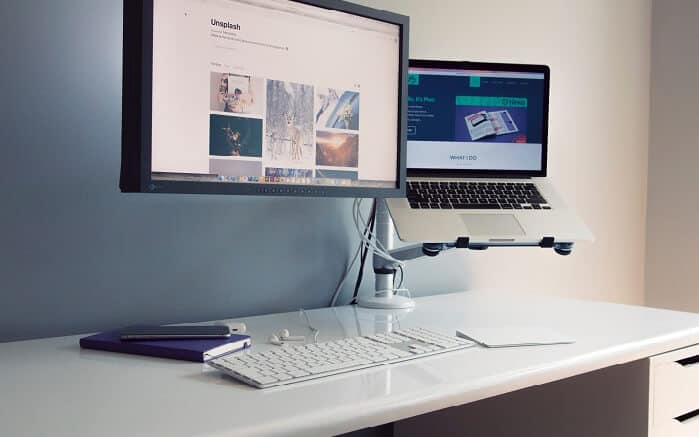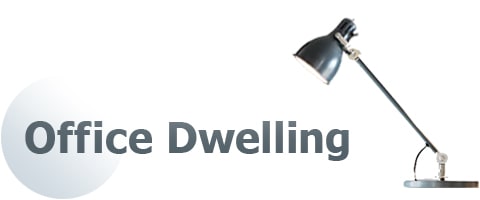
A home office is the lifeline of your work, and it is the connection to your home life as well. Depending on your industry, you may have originally decided to begin this due to the decreased cost of running your business out of your home. Because of that, you likely are not looking to spend a ton of money on your home office. While home offices can be extravagant and use plenty of financial resources, you can cut costs on many options while still getting the essentials.
Furniture Essentials for your Home Office
If you are absolutely cutting costs on everything you can to make your home office up and running with as little money as possible, you can still do nothing without a desk and a chair. You can buy both of these rather cheaply if you are willing to spend the time assembling them, and you can get them anywhere from Walmart to Amazon.
While saving money on this furniture, it is important to make sure you get what you need. A desk needs drawers and storage space because the worst way to work is to have a bunch of papers and supplies piling up in front of your face. It gets claustrophobic and distracting easily.
With chairs, having something comfortable is worth more than you may think. Having something that encourages good posture helps you to be productive by keeping your respiration normal and your focus high. Solid chairs that encourage good posture do not cost a ton either, so do not be afraid to upgrade from the kitchen chair your wife keeps asking you to put back in the dining room.
Supplies for the Home Office
Getting the right supplies for your home office is a must of course. You will need stationery and organization tools. You will need all sorts of computer equipment as we will cover further later. You will also need the comforts of life to keep you sane through work.
Cheap stationery is of course incredibly easy to find, though finding the stuff that helps you work best and look professional when necessary is vital. Organization tools are also cheap, but they can be easy to cut out completely when you are on a tight budget. This is a poor idea, and it is a well-disguised pitfall. Organization is a huge key to getting productive work, and most home-office workers would easily agree with that. Even if they agree that organization is important, many will still not spend the money on organizational tools. It does not take much to get files in order, off the desk, and color-code a little. Make sure to make organization a priority because saving money on tools like this can simply lead to making less money for the business.
There are some comforts that may be necessary for helping you to be more productive. Most people cannot get their work done without a cup of coffee. No one should be trying to get their work done without breakfast, but many do nonetheless. Sometimes, a bit of incense or candles can help you get your work done better in important moments of productivity. This is not a guide on how to save money on breakfast, but investing in a quality coffee you can make from home by buying in bulk is obviously going to be much better financially than taking a daily trip to Starbucks. Again, some of these things are worth investing in if you need them to get work done, but it is important to be responsible with these treats for yourself.
Making use of Wall Space in your Home Office
Buying file cabinets is both wasteful of money and space in your home office. A couple hundred dollars on something like that is not the way to organize your things. If you are willing to make use of the wall space in your home office, you may find that you can keep things organized easily, cheaply, and efficiently. Hanging a file organizer on the wall keeps everything in shape, and it lets you have everything just a step away for a few dollars and have much more space available in your home office.
Computer Equipment
The most important part of many homeworkers’ home office is the computer where they do most of their work. Choosing the right computer and the equipment to go with it without breaking your bank is a huge burden, and it can be both confusing and daunting. However, finding the right computer is not that hard if you just boil it down to one simple question: What do you need your computer to do?
If you are just checking email, doing basic internet usage, and maybe running some music with very light streaming, you can get away with low performing specifications and never notice the difference. If you need to run multiple applications at once while streaming, and you want your computer to be a high-performing gaming setup at the same time, well you have to pay for that.
For the most part, laptops are just as good as desktops whether you have high demands or low demands for computer specifications. They cost a little bit more of course just for the mobility, but that mobility is always going to be a huge benefit, though you will likely not notice it as much until you do not have that option for mobility and wish you did. Personally, I think desktops are best when you have a backup laptop to use for simple tasks.
The last conversation is whether you are going to pick PC or Mac or Linux. If you do not know what Linux is, just ignore it anyways because it will not be your best choice. As far as the difference between PC and Mac, there is a bit of a myth that Macs are always more expensive and perform less highly. There are certain programs Macs cannot, or at least cannot yet, run. Therefore, make sure whatever programs you are going to need can be run on a Mac before you go in on one. There are other myths that Macs cannot get viruses and that all of your iLife utility belt works better when you use it altogether. These are marketing ploys and are not really true.
At the end of the day, once you have decided that all other factors are about the same as far as you are concerned, just pick the cheapest one. Shopping for a computer does not need to be rocket science. It needs to be a clean investment that makes money for your home business, not sucks money out.
For a fuller guide on how to shop for a computer for your home office, check out our full article on How to Pick the Perfect Computer for your Home Office and Business [link].
The Home Office Makes Money before it Takes Money
Remember the one truth about running a business out of your home office: it makes money for you, not the other way around. Do not continue to pour money into a business that is not yet making you money. Perhaps, it needs to stay a hobby until you have a bit more under your feet. But if the goals is to make a successful home office to develop your business, then the business needs to show you its own fruit before you put significant money into developing a home office.
A chair and a desk may be necessary, and a computer may be needed anyways, but do not put money into an effort that has not shown it can provide for itself. If the focus is too much on saving money for the home office, then perhaps, it is time to look at whether any money can be afforded for it at all. Remember to take things slow with your home business. Believe in the cause and the future of what you can create, but be responsible about it. Once you have decided the cause is profitable and valuable, then you can really begin to make that perfect home office with all the bells and whistles.
